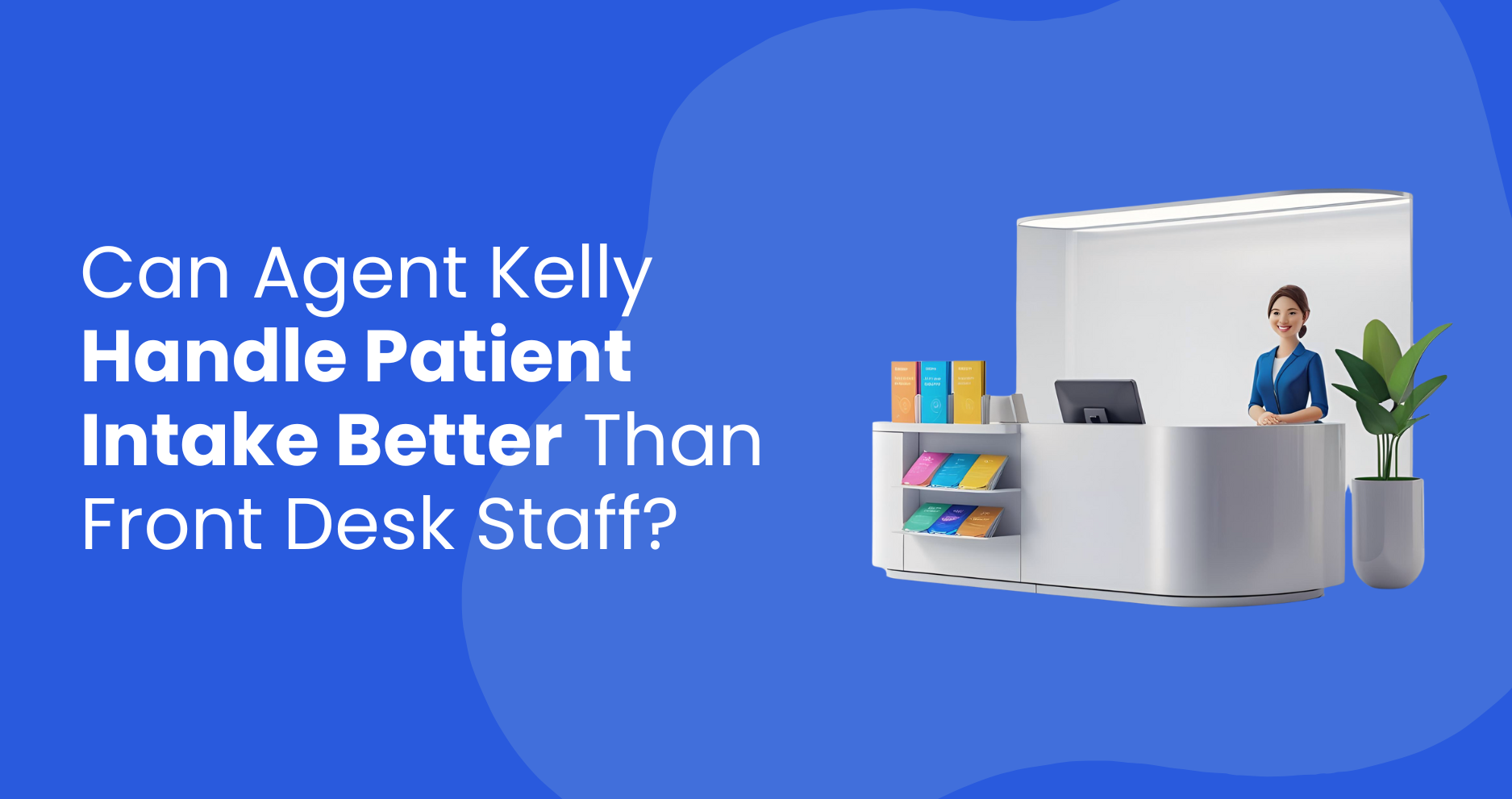Kelly handles patient intake better than traditional front desk staff because Kelly was designed specifically for this purpose. No distractions, no bad days, no training gaps. Just consistent, intelligent, patient-focused service that scales with practice needs.

We’ve spent years watching US healthcare practices struggle with the same fundamental problem: front desk chaos. The endless phone calls, scheduling conflicts, no-shows, insurance verification nightmares, and overwhelmed staff members who juggle ten tasks at once while trying to maintain a friendly demeanor with frustrated patients.
The statistics paint a grim picture too. The average medical practice loses $150,000 annually due to poor scheduling practices and administrative inefficiencies. Front desk turnover rates in healthcare hover around 75% annually, creating constant disruption and training costs. Meanwhile, patients wait an average of 24 minutes past their appointment time, and nearly 30% of appointments result in no-shows because of poor communication and scheduling mishaps.
Essentially, we’ve been trying to solve 21st-century problems with 20th-century solutions. We keep hiring more staff, implementing more complex systems, and wondering why nothing improves. The truth is, traditional front desk operations aren’t broken because people aren’t trying hard enough. The system itself is fundamentally flawed for the demands of modern healthcare.
In 2025, it’s time to turn to AI agents.
The COVID-19 pandemic accelerated these challenges exponentially. Telehealth integration, enhanced safety protocols, and increased patient volume created additional layers of complexity that traditional staffing models simply cannot handle efficiently.
This is where AI agents like Kelly transform everything. Instead of adding more human complexity to an already complex system, we’re introducing intelligent automation that actually simplifies operations while improving patient experience.
Kelly operates as a sophisticated scheduling and patient intake system that integrates seamlessly with existing calendars and practice management software. But calling Kelly just a “scheduling tool” misses the bigger picture. Kelly represents a fundamental shift in how healthcare practices can operate.
When patients call to schedule appointments, Kelly doesn’t just check availability. Kelly understands context, preferences, and medical requirements. Need a follow-up appointment six weeks post-surgery? Kelly automatically identifies the appropriate time window and provider. Trying to schedule a complex procedure that requires pre-authorization? Kelly initiates the insurance verification process immediately.
The beauty lies in Kelly’s ability to handle multiple complex interactions simultaneously without losing focus or making errors. While traditional front desk staff can effectively manage maybe three phone calls per hour with full attention to detail, Kelly processes dozens of scheduling requests, insurance verifications, and patient communications concurrently.
The transformation in practices implementing AI agents like Kelly is remarkable. Patient wait times drop by an average of 40% because scheduling becomes more precise and efficient. No-show rates decrease by 35% due to automated reminders and better initial scheduling practices. Staff satisfaction scores increase dramatically because team members can focus on high-value patient interactions instead of administrative grunt work.
But the financial impact tells the real story. Practices typically see a 25% increase in appointment capacity without adding staff hours. Revenue cycle improvements from better insurance verification and reduced administrative errors often exceed $200,000 annually for mid-sized practices.
Kelly’s calendar synchronization capabilities eliminate the double-booking disasters that plague traditional scheduling. When providers update their availability, Kelly instantly adjusts patient communications and scheduling options. No more awkward phone calls explaining that Dr. Johnson is actually in surgery when Mrs. Patterson arrives for her appointment.
What’s more exciting about AI agents in healthcare is their potential to revolutionize the entire patient experience, not just appointment scheduling. Kelly manages patient intake forms, insurance verification, appointment reminders, and post-visit follow-up communications as a seamless, integrated process.
Imagine patients receiving their intake forms automatically after scheduling, with intelligent field population based on their medical history and appointment type. Kelly validates insurance eligibility in real-time, preventing the billing surprises that damage patient trust and practice revenue. Appointment reminders adapt based on patient preferences and past behavior, reducing no-shows while maintaining personal connection.
The front desk transforms from a reactive, firefighting operation into a proactive patient experience engine. Staff members become patient advocates and relationship builders instead of administrative processors.
This is not some distant technological possibility. AI agents like Kelly are operational in healthcare practices right now, delivering measurable improvements in efficiency, patient satisfaction, and financial performance. The practices embracing this technology gain significant competitive advantages while their traditional competitors struggle with the same old problems.
The question isn’t whether AI agents will replace traditional front desk operations. The question is how quickly forward-thinking practices will implement these solutions to better serve their patients and communities.
Kelly handles patient intake better than traditional front desk staff because Kelly was designed specifically for this purpose. No distractions, no bad days, no training gaps. Just consistent, intelligent, patient-focused service that scales with practice needs.
The front desk of the future runs itself, and that future is available today. The only question remaining is whether you’re ready to embrace it.
Top quality ensured or we work for free
